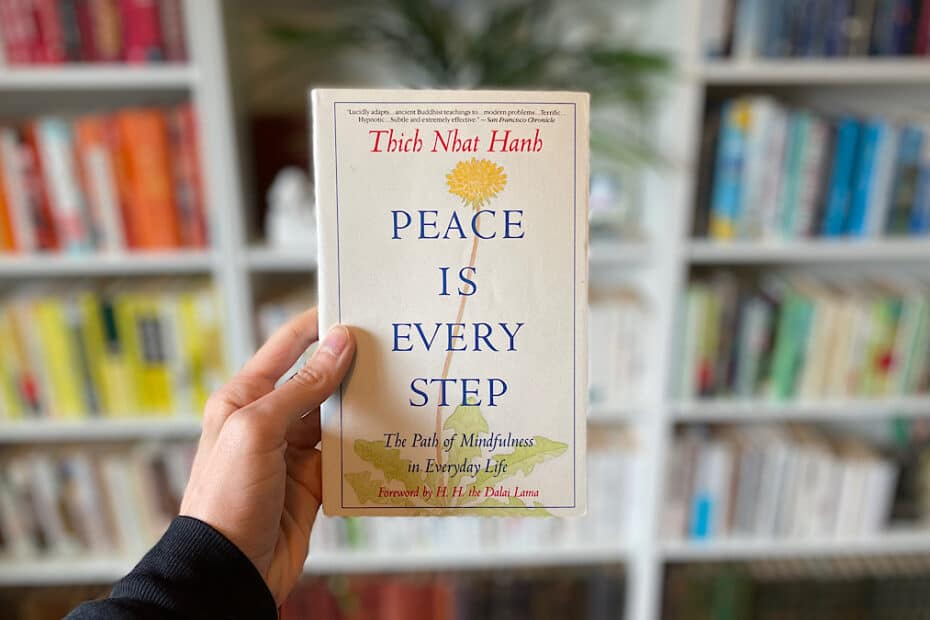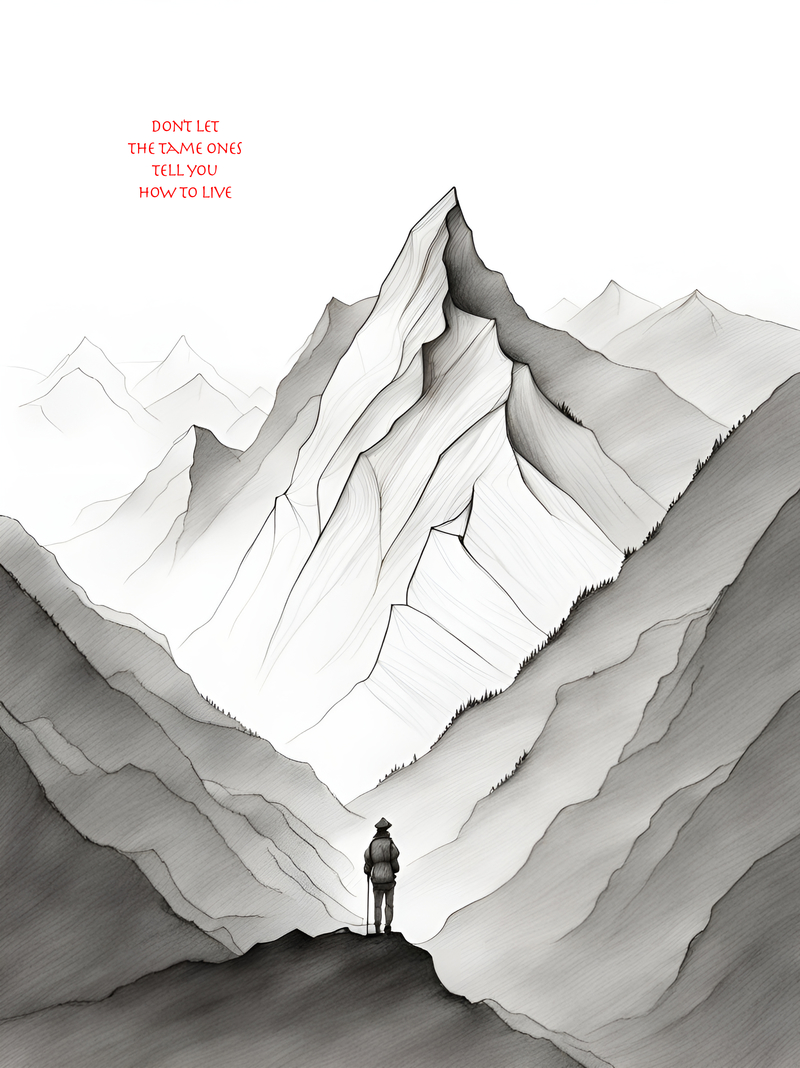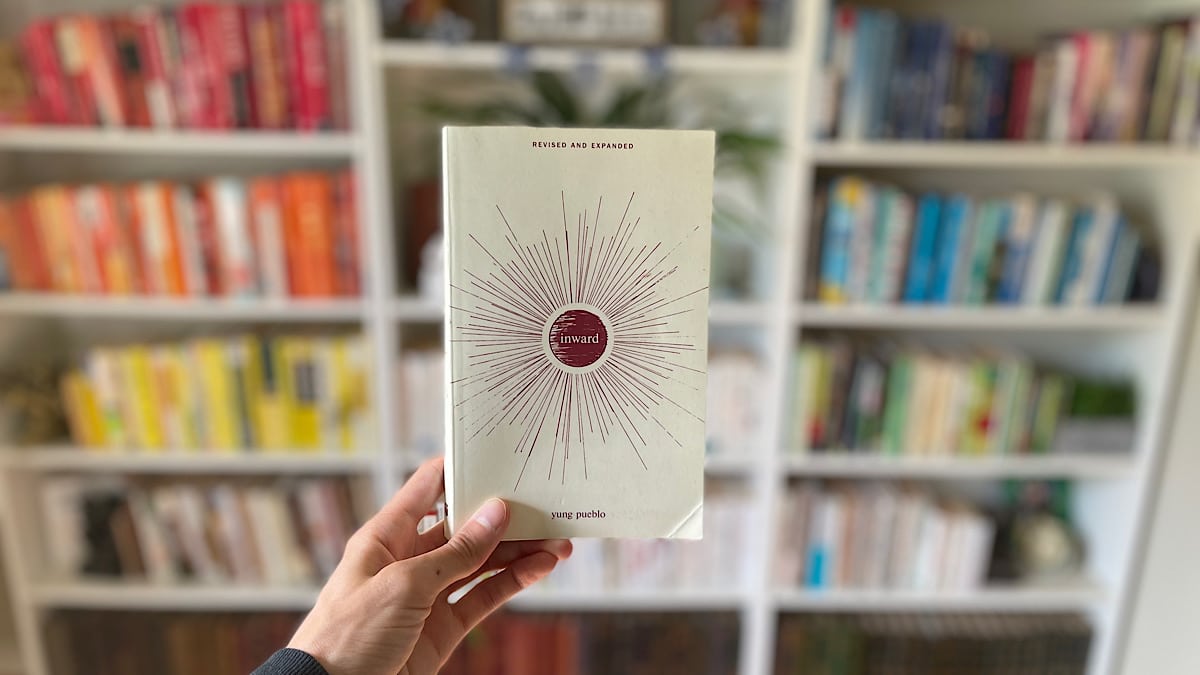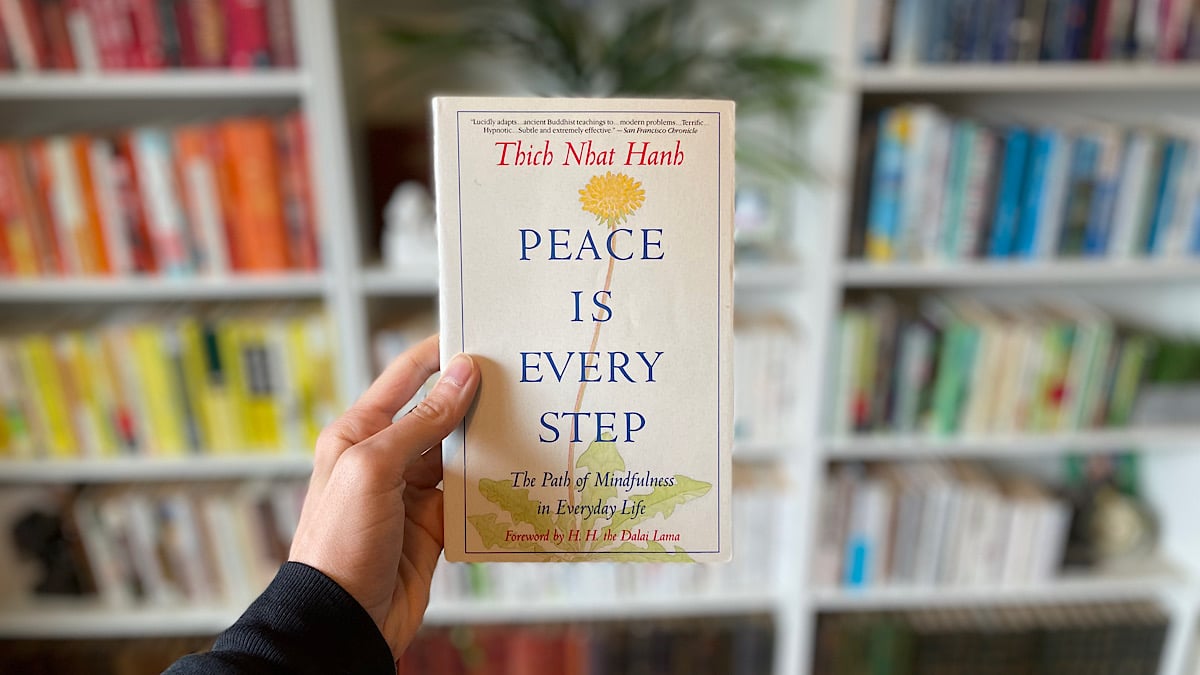Excerpt: In the rush of life, we tend to lose touch with the peace that is available in each moment. These quotes from Peace Is Every Step will help…
Click Here to jump right to our list of Quotes from Peace is Every Step!
Introduction: Solutions to universal challenges
In the rush of modern life, we tend to lose touch with the peace that is available in each moment. World-renowned Zen master, spiritual leader, and author Thich Nhat Hanh shows us how to make positive use of the very situations that usually pressure and antagonize us.
In his book, Peace is Every Step, Thich Nhat Hanh discusses solutions and action steps to universal challenges and issues that we face as humans. These challenges and issues include: overcoming anxiety, fear, and depression and how to feel more fulfilled, calm, and happy in the present moment; understanding anger and learning how to live in a more compassionate, blissful state; and bringing peace to both our inner and outer worlds with every step we take in life.
One of the fundamental lessons that Thich Nhat Hanh communicates in his book is that any large scale change—on a community or global level—must (and always) starts with the individual. Peace work is not a means, Nhat Hanh reminds us, it is the way.
In the forward to the book, the Dalai Lama introduces this point and discusses the importance of becoming a more compassionate, mindful, and peaceful person and the ripples that our actions have on the larger scale. He says:
“Although attempting to bring about world peace through the internal transformation of individuals is difficult, it is the only way. Wherever I go, I express this, and I am encouraged that people from many different walks of life receive it well. Peace must first be developed within an individual. And I believe that love, compassion, and altruism are the fundamental basis for peace. Once these qualities are developed within an individual, he or she is then able to create an atmosphere of peace and harmony. This atmosphere can be expanded and extended from the individual to his family, from the family to the community and eventually to the whole world.”
Below, you will find 20 powerful Thich Nhat Hanh quotes from Peace is Every Step. We encourage you to drink deeply from his words and reflect on ways you might be able to adopt these principles in your life. Any and all great change starts with one—and today, I hope that one will be you.
NEW In The Shop: Don’t Let The Tame Ones Tell You How To Live [Poster]
Why We ♥ It: Some of the best advice I (Matt here) ever got was: don’t take life advice from people who aren’t living a life you want to live and don’t take criticism from people you wouldn’t go to for advice. I created this poster to act as a reminder to listen more closely to our role models and less closely to our critics, trolls, and tamed-comfort-zone-hugger acquaintances. It’s also a perfect gift for the outdoor adventurer, travel enthusiast, or solo explorer (or soon to be). Available in print or digital download. 👇🏼
...Want to advertise your book, product, or service? Send inquiries to matt@movemequotes.com.
The List: 20 Thich Nhat Hanh Quotes from Peace Is Every Step on Mindfulness, Compassion, and Joy:
“We can realize peace right in the present moment with our look, our smile, our words, and our actions. Peace work is not a means. Each step we make should be peace. Each step we make should be joy. Each step we make should be happiness. If we are determined , we can do it. We don’t need the future. We can smile and relax. Everything we want is right here in the present moment.”
Thich Nhat Hanh, Peace is Every Step (Read Matt’s Blog on this quote here)
“Enlightenment, peace, and joy will not be granted by someone else. The well is within us, and if we dig deeply in the present moment, the water will spring forth. We must go back to the present moment in order to be really alive.”
Thich Nhat Hanh, Peace is Every Step
“In our daily lives, we may see the people around us, but if we lack mindfulness, they are just phantoms, not real people, and we ourselves are also ghosts. Practicing mindfulness enables us to become a real person. When we are a real person, we see real people around us, and life is present in all its richness.”
Thich Nhat Hanh, Peace is Every Step
“We can smile, breathe, walk, and eat our meals in a way that allows us to be in touch with the abundance of happiness that is available. We are very good at preparing to live, but not very good at living. We know how to sacrifice ten years for a diploma, and we are willing to work very hard to get a job, a car, a house, and so on. But we have difficulty remembering that we are alive in the present moment, the only moment there is for us to be alive. Every breath we take, every step we make, can be filled with peace, joy, and serenity. We need only to be awake, alive in the present moment.”
Thich Nhat Hanh, Peace is Every Step
“If a child smiles, if an adult smiles, that is very important. If in our daily lives we can smile, if we can be peaceful and happy, not only we, but everyone will profit from it. If we really know how to live, what better way to start the day than with a smile? Our smile affirms our awareness and determination to live in peace and joy. The source of a true smile is an awakened mind.”
Thich Nhat Hanh, Peace is Every Step
“The foundation of happiness is mindfulness. The basic condition for being happy is our consciousness of being happy. If we are not aware that we are happy, we are not really happy. When we have a toothache, we know that not having a toothache is a wonderful thing. But when we do not have a toothache, we are still not happy. A non-toothache is very pleasant. There are so many things that are enjoyable, but when we don’t practice mindfulness, we don’t appreciate them. When we practice mindfulness, we come to cherish these things and we learn how to protect them. By taking good care of the present moment, we take good care of the future. Working for peace in the future is to work for peace in the present moment.”
Thich Nhat Hanh, Peace is Every Step
“Breathing in and out is very important, and it is enjoyable. Our breathing is the link between our body and our mind. Sometimes our mind is thinking of one thing and our body is doing another, and mind and body are not unified. By concentrating on our breathing, ‘In’ and ‘Out,’ we bring body and mind back together, and become whole again. Conscious breathing is an important bridge.”
Thich Nhat Hanh, Peace is Every Step
“Nature is our mother. Because we live cut off from her, we get sick. Some of us live in boxes called apartments, very high above the ground. Around us are only cement, metal, and hard things like that. Our fingers do not have a chance to touch the soil; we don’t grow lettuce anymore. Because we are so distant from our Mother Earth, we become sick. That is why we need to go out from time to time and be in nature. It is very important.”
Thich Nhat Hanh, Peace is Every Step
“We often ask, ‘What’s wrong?’ Doing so, we invite painful seeds of sorrow to come up and manifest. We feel suffering, anger, and depression, and produce more such seeds. We would be much happier if we tried to stay in touch with the healthy, joyful seeds inside of us and around us. We should learn to ask, ‘What’s not wrong?’ and be in touch with that. There are so many elements in the world and within our bodies, feelings, perceptions, and consciousness that are wholesome, refreshing, and healing. If we block ourselves, if we stay in the prison of our sorrow, we will not be in touch with these healing elements.”
Thich Nhat Hanh, Peace is Every Step
“Anger is rooted in our lack of understanding of ourselves and of the causes, deep-seated as well as immediate, that brought about this unpleasant state of affairs. Anger is also rooted in desire, pride, agitation, and suspicion. The primary roots of our anger are in ourselves. Our environment and other people are only secondary. It is not difficult for us to accept the enormous damage brought about by a natural disaster, such as an earthquake or a flood. But when damage is caused by another person, we don’t have much patience. We know that earthquakes and floods have causes, and we should see that the person who has precipitated our anger also has reasons, deep-seated and immediate, for what he has done.”
Thich Nhat Hanh, Peace is Every Step
…Enjoying these quotes? Grab your copy of Peace Is Every Step 👇🏼

Book Overview: In the rush of modern life, we tend to lose touch with the peace that is available in each moment. World-renowned Zen master, spiritual leader, and author Thich Nhat Hanh shows us how to make positive use of the very situations that usually pressure and antagonize us. For him a ringing telephone can be a signal to call us back to our true selves. Dirty dishes, red lights, and traffic jams are spiritual friends on the path to “mindfulness”—the process of keeping our consciousness alive to our present experience and reality. The most profound satisfactions, the deepest feelings of joy and completeness lie as close at hand as our next aware breath and the smile we can form right now.
“If we become angry at our anger, we will have two angers at the same time. We only have to observe it with love and attention. If we take care of our anger in this way, without trying to run away from it, it will transform itself. This is peacemaking. If we are peaceful in ourselves, we can make peace with our anger. We can deal with depression, anxiety, fear, or any unpleasant feeling in the same way.”
Thich Nhat Hanh, Peace is Every Step
“Someone who speaks badly to us may have been spoken to in exactly the same way just the day before, or by his alcoholic father when he was a child. When we see and understand these kinds of causes, we can begin to be free from our anger. I am not saying that someone who viciously attacks us should not be disciplined. But what is most important is that we first take care of the seeds of negativity in ourselves. Then if someone needs to be helped or disciplined, we will do so out of compassion, not anger and retribution. If we genuinely try to understand the suffering of another person, we are more likely to act in a way that will help him overcome his suffering and confusion, and that will help all of us.”
Thich Nhat Hanh, Peace is Every Step
“Even if we have a lot of money in the bank, we can die very easily from our suffering. So, investing in a friend, making a friend into a real friend, building a community of friends, is a much better source of security. We will have someone to lean on, to come to, during our difficult moments.”
Thich Nhat Hanh, Peace is Every Step
“We have to continue to practice mindfulness and reconciliation until we can see a child’s body of skin and bones in Uganda or Ethiopia as our own, until the hunger and pain in the bodies of all species are our own. Then we will have realized nondiscrimination, real love. Then we can look at all beings with the eyes of compassion, and we can do the real work to help alleviate suffering.”
Thich Nhat Hanh, Peace is Every Step
“When you understand, you cannot help but love. You cannot get angry. To develop understanding, you have to practice looking at all loving beings with the eyes of compassion. When you understand, you cannot help but love. And when you love, you naturally act in a way that can relieve the suffering of people.”
Thich Nhat Hanh, Peace is Every Step (Read more on this quote here)
“The source of love is deep in us, and we can help others realize a lot of happiness. One word, one action, or one thought can reduce another person’s suffering and bring him joy. One word can give comfort and confidence, destroy doubt, help someone avoid a mistake, reconcile a conflict, or open the door to liberation. One action can save a person’s life or help him take advantage of a rare opportunity. One thought can do the same, because thoughts always lead to words and actions. If love is in our heart, every thought, word, and deed can bring about a miracle.”
Thich Nhat Hanh, Peace is Every Step
“We really have to understand the person we want to love. If our love is only a will to possess, it is not love. If we only think of ourselves, if we know only our own needs and ignore the needs of the other person, we cannot love. We must look deeply in order to see and understand the needs, aspirations, and suffering of the person we love. This is the ground of real love. You cannot resist loving another person when you really understand him or her.”
Thich Nhat Hanh, Peace is Every Step (Read more on this quote here)
“Hope is important, because it can make the present moment less difficult to bear. If we believe that tomorrow will be better, we can bear a hardship today. But that is the most that hope can do for us—to make some hardship lighter. When I think deeply about the nature of hope, I see something tragic. Since we cling to our hope in the future, we do not focus our energies and capabilities on the present moment. We use hope to believe something better will happen in the future, that we will arrive at peace, or the Kingdom of God. Hope becomes a kind of obstacle. If you can refrain from hoping, you can bring yourself entirely into the present moment and discover the joy that is already here.”
Thich Nhat Hanh, Peace is Every Step
“Consciousness exists on two levels: as seeds and as manifestations of these seeds. Suppose we have a seed of anger in us. When conditions are favorable, that seed may manifest as a zone of energy called anger. It is burning, and it makes us suffer a lot. It is very difficult for us to be joyful at the moment the seed of anger manifests. Every time a seed has an occasion to manifest itself, it produces new seeds of the same kind. If we are angry for five minutes, new seeds of anger are produced and deposited in the soil of our unconscious mind during those five minutes. That is why we have to be careful in selecting the kind of life we lead and the emotions we express. When I smile, the seeds of smiling and joy have come up. As long as they manifest, new seeds of smiling and joy are planted. But if I don’t practice smiling for a number of years, that seed will weaken, and I may not be able to smile anymore.”
Thich Nhat Hanh, Peace is Every Step
“We can smile, breathe, walk, and eat our meals in a way that allows us to be in touch with the abundance of happiness that is available. We are very good at preparing to live, but not very good at living. We know how to sacrifice ten years for a diploma, and we are willing to work very hard to get a job, a car, a house, and so on. But we have difficulty remembering that we are alive in the present moment, the only moment there is for us to be alive. Every breath we take, every step we make, can be filled with peace, joy, and serenity. We need only to be awake, alive in the present moment.”
Thich Nhat Hanh, Peace is Every Step
If you enjoyed this list of quotes from Peace Is Every Step, then you should consider reading Thich Nhat Hanh’s book in full. It comes highly recommended:

Book Overview: In the rush of modern life, we tend to lose touch with the peace that is available in each moment. World-renowned Zen master, spiritual leader, and author Thich Nhat Hanh shows us how to make positive use of the very situations that usually pressure and antagonize us. For him a ringing telephone can be a signal to call us back to our true selves. Dirty dishes, red lights, and traffic jams are spiritual friends on the path to “mindfulness”—the process of keeping our consciousness alive to our present experience and reality. The most profound satisfactions, the deepest feelings of joy and completeness lie as close at hand as our next aware breath and the smile we can form right now.
Other Post(s) Inspired by this Book:
- How To Live More Mindfully – The Fourteen Mindfulness Trainings of the Order of Interbeing
- How to Handle Your Anger – A Mindfulness Exercise from Thich Nhat Hanh
- Pillow Punching – Good or Bad for Anger Management?
- Thich Nhat Hanh Quote on the Present Moment and Appreciating the Flower When It’s Shown To You (Beyond the Quote 238/365)
Read Next:
NEW In The Shop: Don’t Let The Tame Ones Tell You How To Live [Poster]
Why We ♥ It: Some of the best advice I (Matt here) ever got was: don’t take life advice from people who aren’t living a life you want to live and don’t take criticism from people you wouldn’t go to for advice. I created this poster to act as a reminder to listen more closely to our role models and less closely to our critics, trolls, and tamed-comfort-zone-hugger acquaintances. It’s also a perfect gift for the outdoor adventurer, travel enthusiast, or solo explorer (or soon to be). Available in print or digital download. 👇🏼
...Want to advertise your book, product, or service? Send inquiries to matt@movemequotes.com.

Written by Matt Hogan
Founder of MoveMe Quotes. On a mission to help busy people do inner work—for better mental health; for healing; for personal growth. Find me on Twitter / IG / Medium. I also share daily insights here. 🌱
It has taken me 1,000’s of hours to build this free library for you. If it has helped you, you can support my continued effort here. ☕️






